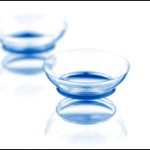What Are The Different Types Of Contact Lenses?
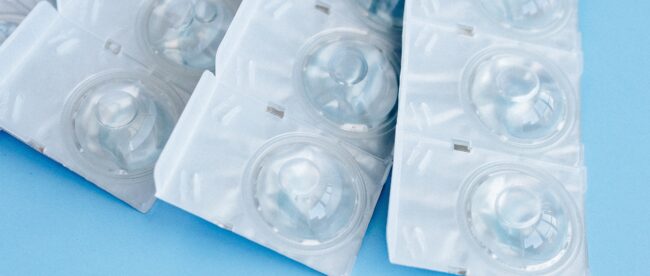
Contact lenses are available in many types. While some may suit your preferences, others may not. That is why it is best to consult a medical expert before you opt for any contact lens. But if you do not know the different types of contact lenses, it might give you a challenging time identifying which is most compatible for you.
In this article, we will explain the different types of contact lenses to you for utmost convenience. So, why keep waiting? Make sure you take a comprehensive look at it.

Contact lens types based on material used:
1. Soft Contact Lenses
If you suffer from refractive errors like nearsightedness, farsightedness, and astigmatism, soft contact lenses may help treat them. They are generally comfortable and easy to wear. What is even more intriguing is that soft contact lenses come in diverse kinds. Daily wear lenses and overnight wear lenses are the two main types to find. While the daily wear lens is good for everyday use, overnight ones can be worn even at nighttime. You can wear these for over 30 days, even when you are asleep. But make sure you speak to your doctor first to understand if this type of lens is suitable for your eyesight.
2. Rigid Gas Permeable Lenses
If you are looking for clear and crisp vision, Rigid gas permeable lenses are the best. People who had also tried soft contact lenses before but did not receive much help may switch to these for comfort. These are also quite breathable and make sure to offer all the convenience you need. However, make sure that you remove these contact lenses from your eyes every night before going off to bed. They must also be cleaned using a disinfectant. Although these contact lenses may require some time for you to adjust to them, they can be quite helpful in the long run.
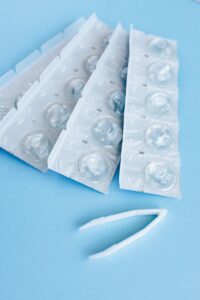
https://www.pexels.com/photo/white-tweezer-on-blue-background-5843414/
3. Specialized Contact Lenses
It depends on your vision to consider what kind of specialized contact lens you wish to use for your eyesight. Hybrid contact lenses tinted contact lenses, and contact lens coatings are some of the best ones we know about. You may also use multifocal contact lenses for utmost convenience. Scleral contact lenses and Orthokeratology are also present for you to scout from. As such, you can be left for choices here and choose the one that your medical expert deems safe for you.
3. Specialized Contact Lenses
It depends on your vision to consider what kind of specialized contact lens you wish to use for your eyesight. Hybrid contact lenses tinted contact lenses, and contact lens coatings are some of the best ones we know about. You may also use multifocal contact lenses for utmost convenience. Scleral contact lenses and Orthokeratology are also present for you to scout from. As such, you can be left for choices here and choose the one that your medical expert deems safe for you.
Different Types of Contact Lenses
Contact lenses have emerged as an excellent alternative to traditional eyewear, providing superior comfort, vision correction, and flexibility for wearers. Each type of contact lens is designed to address specific eye conditions, lifestyle needs, and user preferences. Below, we delve into the different types of contact lenses: Standard, Multifocal, and Toric.
Standard Contact Lenses
Standard contact lenses, also known as spherical lenses, are designed to correct common refractive errors, including myopia (nearsightedness) and hypermetropia (farsightedness). These lenses are called ‘spherical’ because of their uniform shape that creates a single power zone, allowing for consistent vision correction.
Two primary categories fall under Standard Contact Lenses:
- Soft Contact Lenses: Made from flexible hydrogels or silicone hydrogels, these lenses allow oxygen to reach the cornea, promoting comfort and eye health. They can be further divided into daily disposables, weekly disposables, and monthly disposables, depending on the replacement schedule.
- Rigid Gas Permeable (RGP) Contact Lenses: These are more durable and resistant to deposit buildup, providing sharper vision than soft contact lenses. They are made from a firm, durable plastic that transmits oxygen. However, they require a longer adaptation period than soft lenses.
Multifocal Contact Lenses
Multifocal contact lenses are a blessing for individuals suffering from presbyopia, an age-related condition that impairs near vision. This form of contact lenses incorporates multiple prescriptions in a single lens, allowing for clear sight at different distances – near, intermediate, and far.
Two principal design philosophies guide multifocal lenses:
- Simultaneous Vision Lenses: With these lenses, your pupil encompasses all the different power zones at the same time. Your brain learns to select the appropriate zone for the visual task, whether it’s reading a book (near vision) or looking at a landscape (distance vision).
- Segmented (or Alternating) Vision Lenses: These lenses work similarly to bifocal or trifocal glasses, where different segments of the lens have different powers. Your eye switches between these zones depending on the vision required.
Toric Contact Lenses
Toric contact lenses are specially designed to correct astigmatism, a refractive error caused by an irregularly shaped cornea or lens in the eye. Unlike spherical lenses, toric lenses have different optical powers and focal lengths in various orientations.
They are made to align with the astigmatic axis of your eye, providing clear and sharp vision. For this purpose, toric lenses have a mechanism (weighting or truncating part of the lens) to prevent them from rotating and to ensure they stay aligned with your eye’s astigmatism.
Remember, selecting the perfect contact lens depends on various factors, including your vision problem, eye health, lifestyle, and comfort. Therefore, it’s crucial to consult with your optometrist or ophthalmologist to understand which type of contact lens is most suitable for you.
Contact Lens Types by Different Wearing Patterns
Beyond the lens type and vision correction functionality, contact lenses can also be categorized by their wearing patterns. This differentiation primarily focuses on how often lenses should be replaced. The categories include daily disposables, two-weekly disposables, monthly disposables, and extended wear lenses.
Daily Disposable Contact Lenses
As the name suggests, daily disposable contact lenses are designed for a single day’s use. At the end of the day, they are discarded, and a fresh pair is used the following day.
This type of lens offers the advantage of a lower risk of infection and no cleaning requirements. They are ideal for people with allergies, as there’s less time for deposits to build up on the lenses.
Two-weekly Disposable Contact Lenses
Two-weekly disposable lenses are designed to be used for up to two weeks. They need to be cleaned and stored in a disinfecting solution at the end of each day.
These lenses offer a balance between affordability and the convenience of short-term use.
Monthly Disposable Contact Lenses
Monthly disposable lenses are worn during the day and cleaned and stored overnight for up to a month.
These lenses are usually made of materials that resist deposits and are quite cost-effective, especially for regular wearers. However, they require a consistent cleaning regimen to ensure eye health.
Extended Wear Lenses
Extended wear lenses are designed to be worn continuously, even during sleep, for an extended period – typically a week, and some types can be used up to 30 days. They are made of breathable materials that allow adequate oxygen flow to the cornea during the extended wear period. Despite their convenience, they pose a higher risk of eye infections than other types of lenses, so they may not be suitable for everyone.
How to Choose Types of Contact Lenses for You?
Selecting the right type of contact lens is a significant decision, which requires a comprehensive understanding of various individual factors. Here are some key tips for contact lens wearers:
Your Eye Condition
Depending on the specific vision issue you need to address, certain types of lenses will be more suitable. For example, for myopia and hypermetropia, standard contact lenses usually suffice. However, if you have presbyopia, you might require multifocal lenses that cater to different vision ranges. Similarly, if you’re dealing with astigmatism, toric lenses designed specifically for this condition would be your best bet.
It is best to discuse it with your eye doctor. In order to correct vision problems you need to know exactly what’s wrong with your eyes and get contact lens prescription.
Your Personal Habits
Your personal habits can play a vital role in determining the type of contact lenses that would be most suitable for you. If you have a meticulous nature and don’t mind the process of cleaning and storing your lenses, monthly disposable or two-weekly disposable lenses might be a good option. These lenses require careful and regular maintenance, but they also offer cost-effectiveness and a lesser environmental impact than daily disposables.
Alternatively, if you have a habit of falling asleep with your lenses on, extended wear contacts, which are designed to be safe for overnight wear, could be a practical choice. This would allow you to keep your lenses in when you sleep without the worries associated with doing so in lenses not designed for this purpose.
Your Comfort
Comfort is crucial when it comes to contact lenses. Soft lenses are typically more comfortable to wear, particularly for first-time users, due to their flexible and “soft” material. However, if sharpness of vision is a priority, hard contact lenses (RGP) might be the way to go. Despite requiring a longer adaptation period, they provide superior clarity and are often preferred by users with high astigmatism or keratoconus.
Your Eye Health
Personal eye health can significantly influence the type of lens that’s appropriate for you. For instance, if you suffer from dry eyes, you might opt for lenses made from materials designed to retain moisture throughout the day.
Similarly, if you have a history of allergies or are prone to eye infections, daily disposable lenses could be more suitable due to their reduced risk of accumulating allergens or bacteria.
Reminder: Always remember to ask your eye doctor or optometrist for a advice. Professional advice from those experts can help you to avoid any eye infection or other issiuse related to wearing wrong contact lenses.
The Bottom Line
We hope you found this article useful. If you do, make sure you consult your medical expert before buying contact lenses from https://www.contactlenses4us.com/. They will help you buy the best one as per your comfort and need.
See also:
- What is DIA and BC in Contact Lens
- Computer vision syndrome (Digital eye strain)
- How to Take Care of Your Eyes and Contact Lenses During Winter
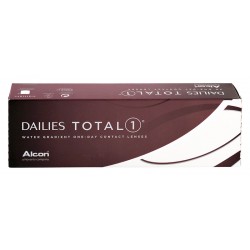
Dailies Total 1 (30)
Dailies Total 1 With all the innovations of today’s modern world, don’t settle for anything less. Why risk discomfort ...
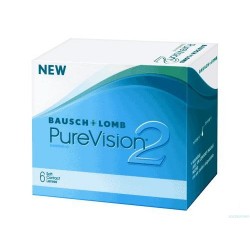
Purevision 2HD contact lenses
PureVision 2HD from Bausch + Lomb offers a distinct blend of convenience, comfort, and superior vision quality. These spheric...
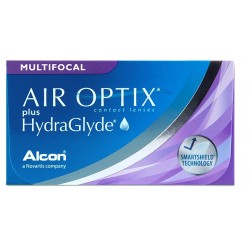
AIR OPTIX® Plus Hydraglyde MULTIFOCAL (3)
Air Optix Plus HydraGlyde Multifocal 3 contact lenses If you’re looking for a fantastic alternative to corrective glasses, ...

